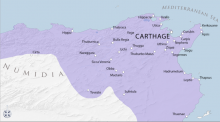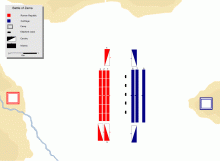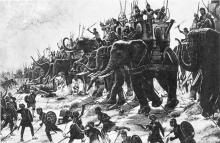Hannibal, although still unbeaten in Italy, is recalled to Africa (1–2). He is defeated by Scipio at the Battle of Zama, October 202 BC (3). He avoids a Numidian ambush and raises a new army in Hadrumetum (4).
(1) hinc: "next" (as in 4.3).
dēfēnsum: supine, used to express purpose after a verb of motion, revocātus (AG §509). As a verbal noun the supine can take a direct object, patriam.
P. Scīpiōnem, fīlium ēius: Publius Cornelius Scipio (236–183 BC), son of Publius Cornelius Scipio Asina (4.1–2). Scipio ranks as one of Rome’s greatest generals. After he completed the Roman conquest of Hispania (210–206 BC) he was elected consul at the age of only 31, with the assumption that he would lead the invasion of Africa. But Fabius Maximus and other conservative leaders in the Roman Senate feared the continued presence of Hannibal in southern Italy and the audacity of the young Scipio. Assigned to Sicily without an army, he raised a volunteer force of cavalry and eventually won permission to invade Africa. In 203 BC he destroyed an army of Carthaginian and Numidian forces near Utica by burning down their camp. Scipio’s defeat of Hannibal at Zama in the following year would earn him the agnomen, "Africanus." [supplementary text: Appian recounts Hannibal’s apocryphal conversation with Scipio]
prīmō apud Rhodanum, iterum apud Padum, tertiō apud Trebiam: Hannibal’s series of victories over Scipio Asina (4.1).
fugā(ve)rat: syncopated pluperfect (AG §181), "he had put to flight." Note the difference between this transitive verb, fugō, fugāre ("to put to flight"), and the intransitive verb, fugiō, fugere ("to flee").
(2) cum hōc: i.e., Publius Scipio (the future Africanus). Observe how Nepos’ desire to open the sentence with a connective demonstrative (hōc) results in the positioning of the prepositional phrase before the ablative absolute.
exhaustīs iam patriae facultātibus: ablative absolute, with causal sense. iam: emphasizes a moment in time that contributes to the state of affairs that is being described, "at this point" or "already" rather than "now" or "then."
inpraesentiārum: adverb, "at present, under the present circumstances"; a colloquial contraction of the phrase, in praesentiā rērum.
bellum compōnere: an idiom, "to make a temporary truce"; compare foedus, a permanent treaty (foederātam cīvitātem, 3.2; ex foedere, 7.5).
quō: introduces a relative clause of purpose with the subjunctive (congrederētur) expressing why Hannibal desired to bellum compōnere (AG §531).
condiciōnēs nōn convēnērunt: condiciōnēs must be the subject of the intransitive convēnērunt, "terms (of peace) were not fitting, suitable, agreed upon." The meeting is perhaps the only time in history that two first-rank generals negotiated face-to-face before battle [supplementary texts: descriptions of the meeting by Polybius and Livy]. Hannibal proposed relinquishing Hispania and the Mediterranean islands; Rome had rejected a more conciliatory offer the year before. The intense alliteration (compōnere...congrederētur. In colloquium convēnit; condiciōnēs nōn convēnērunt) has the effect of rendering the meeting between Scipio and Hannibal as the climax of the war, after which Hannibal's shocking defeat is an anticlimax.
(3) paucīs diēbus: "within a few days" (6.4, 10.4). The battle actually took place the day after the conference.
apud Zamam: The exact site of the battle is unknown, but it likely took place between Sicca Veneria and Zama Regia, approximately 75 miles southwest of the city of Carthage. At Zama Hannibal was at last able to deploy war elephants against the Romans, but to little effect, since Scipio had developed tactics to minimize their effectiveness and Hannibal was forced to use young, untrained elephants that took fright and trampled the Carthaginian lines. [image: Motte, Battle of Zama] Scipio triumphed when his superior Numidian cavalry routed its Carthaginian counterpart and attacked the Carthaginian rear lines. While Roman losses in the battle numbered under 2,000, nearly ten times as many Carthaginians died.
cum eōdem: i.e., Publius Scipio.
incrēdibile dictū: the ablative supine, dictū, is used to indicate an action in reference to an adjective, incrēdibile: "unbelievable to say." Nepos expresses his amazement because this is the first time that Hannibal is defeated in battle (5.4) and because he was able to march a defeated army a great distance across difficult ground in only two days.
bīduō et duābus noctibus: ablative of time when. The march was uninterrupted, continuing day and night.
Hadrūmētum: accusative of place towards which, with pervēnit.
mīlia passuum trecenta: passuum, genitive of the whole (AG §346), "300,000 paces" or 300 Roman miles. The actual distance from Zama to Hadrumetum is closer to 100 Roman miles. Nepos may exaggerate the distance to render Hannibal’s achievement that much more impressive, or he may be following a mistaken source.
(4) Numidae: the Numidians lived in the Carthaginian hinterlands and were known for their expert cavalry. The defection of the Numidians to Scipio was a significant blow to Carthaginian military power.
eī: dative with insidiātī sunt.
nōn sōlum…sed etiam: a common parallel construction, "not only…but also..." (7.5).
reliquōs ē fugā: i.e., the troops who survived the rapid retreat from Zama.
Hadrūmētī: locative.
novīs dīlēctibus: "by new levies." Note that even as Carthage sues for peace, Hannibal prepares to fight on; compare how Nepos framed the war as a contest between Hannibal and the Roman people rather than between Carthage and Rome (1.1–1.2).



